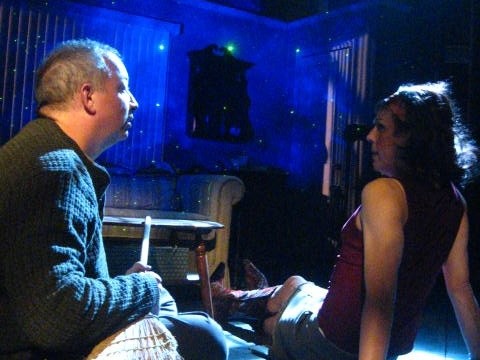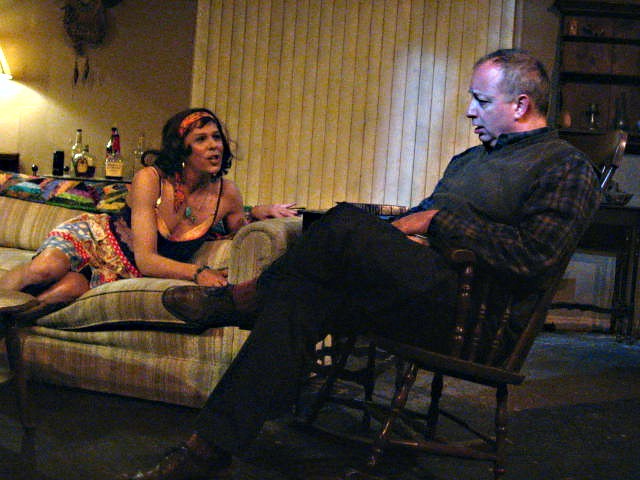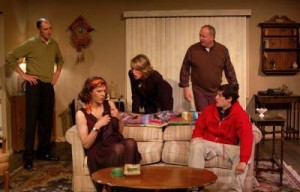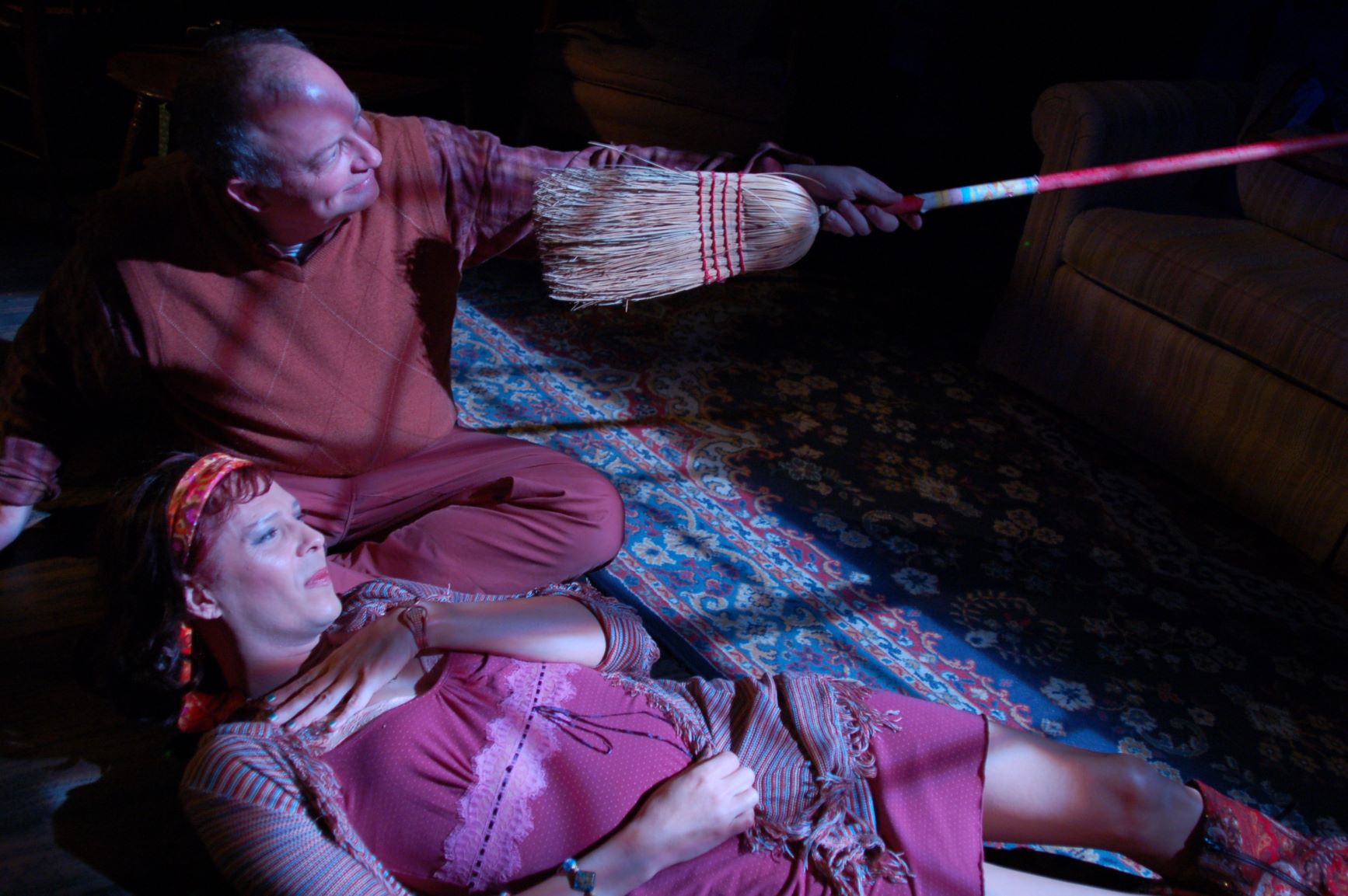
The Elephant Theatre Company’s world premiere production of Anything, written by and starring Timothy McNeill and directed by David Fofi is a perfect example of how rich and rewarding our Los Angeles stage scene is. Exquisitely written and acted, sensitively directed, and gorgeously designed, Anything marks a noteworthy conclusion to 2007 and an auspicious start to ETC’s 12th season of live theater.
 Anything fits snugly into the “misfits in love” genre, a cinematic and theatrical tradition which includes Marty, Edward Scissorhands, and Frankie and Johnny in the Clair de Lune. You know the story. Two lonely people meet and find hope, love, and salvation in each other’s arms. It’s worked before, and it works here, thanks to McNeill’s provocative premise (suicidal middle aged widower meets suicidal transgender prostitute) and the empathetic performances of McNeill, as Mississippi to Hollywood transplant Early Landry, and Louis Jacobs, as Freda Von Rhenberg (not her real name, one would suppose).
Anything fits snugly into the “misfits in love” genre, a cinematic and theatrical tradition which includes Marty, Edward Scissorhands, and Frankie and Johnny in the Clair de Lune. You know the story. Two lonely people meet and find hope, love, and salvation in each other’s arms. It’s worked before, and it works here, thanks to McNeill’s provocative premise (suicidal middle aged widower meets suicidal transgender prostitute) and the empathetic performances of McNeill, as Mississippi to Hollywood transplant Early Landry, and Louis Jacobs, as Freda Von Rhenberg (not her real name, one would suppose).
From the moment we first set eyes on Matt Maenpaa’s set depicting Early’s homey East Hollywood apartment plus one room of Freda’s much seedier neighboring flat, it is clear that Anything will be a quality production, an impression confirmed by Edward S. Marks’ and associate Nick McCord’s poetic lighting design, which reveals from time to time a hitherto unseen upstairs apartment room where a pair of slackers (portrayed by Robert Foster and Josh Breeding) smoke their pot and strum their guitars, providing background music and a upstairs neighbor sidebar during scene changes. (Early occasionally taps on the ceiling demanding them to pipe down.)
We first meet Early just after he’s moved into his new digs, as his well-meaning but meddling sister Laurette (Cheryl Huggins in the performance I attended) expresses concern about her brother’s new neighborhood. Why couldn’t he have chosen Santa Monica or Brentwood instead of a part of town where noisy police helicopters hover at night? “Call me if any of those feelings come back,” Laurette reminds Early, advising him to “just sing ‘Penny Lane’ like the chipmunks (as Early used to do as a child) whenever you have morbid thoughts.” (“Penny Lane” returns later in the play during a very funny\ sequence involving Early’s answering machine.)
Meanwhile next door, Freda’s young stud of a boyfriend Larry (hunky/menacing Max Williams) is moving out after a couple years of living with her in order to be with “Fat Ass” (Freda’s words), someone who’ll offer Larry a “bullshit-free environment” with a promise to record him. As Early eavesdrops from his apartment, Larry pushes Freda offstage and we hear him beating her up, certainly not for the first time.
 A neighborly visit, ostensibly to borrow sugar, introduces the outrageous-acting Freda to Early. Her mini skirted long long legs and her already statuesque height enhanced by a pair of gold lamé platforms, Freda is all a series of exaggeratedly sultry poses, including a gawky/seductive pole dance, which leave Early wondering what to make of this very strange apparition.
A neighborly visit, ostensibly to borrow sugar, introduces the outrageous-acting Freda to Early. Her mini skirted long long legs and her already statuesque height enhanced by a pair of gold lamé platforms, Freda is all a series of exaggeratedly sultry poses, including a gawky/seductive pole dance, which leave Early wondering what to make of this very strange apparition.
We soon see how Freda uses sarcastic humor as a weapon and shield. Early does too, telling her “It’s fascinating how you insult and compliment me all in the same sentence.” Little by little, though, Freda lets down her armor, and reveals herself to be just “a girl with a heightened sense of people judging me.” Grieving widower Early, a “man with a pulse and the desire to die,” falls for this odd, gangly trans woman who makes him laugh, and though she is the more resistant of the two, Freda finds herself falling for him as well. The irrepressible Freda brings Early out of his shell just as his calm and and patience soften her, a transformation made all the more moving by McNeil and Jacobs’ superb performances.
 David Franco and Jeremy Glazer join Huggins, as Laurette’s husband Ted and teenage son Jack, for a very funny “Guess Who’s Coming to Dinner?” scene in Act 2. The three visitors dance around the fact that Early is dating a transgender woman until Jack simply blurts it out. Laurette is far less accepting. In fact, she becomes out and out vicious, and we ache for Early and Freda, whose love story we have become invested in.
David Franco and Jeremy Glazer join Huggins, as Laurette’s husband Ted and teenage son Jack, for a very funny “Guess Who’s Coming to Dinner?” scene in Act 2. The three visitors dance around the fact that Early is dating a transgender woman until Jack simply blurts it out. Laurette is far less accepting. In fact, she becomes out and out vicious, and we ache for Early and Freda, whose love story we have become invested in.
Playwright McNeil has written actor McNeil one hell of a meaty part, which he does real justice to, making Early a sad sack with a heart of gold. He is matched every step of the way by Jacobs as Freda, whose proverbial golden heart is buried deep beneath a wise-cracking, self-destructive surface. It is a rewarding pleasure to watch Jacobs’ subtle transformation into the woman to whom Early will truly promise…anything.
Huggins does fine work as Laurette, her vicious attack on Freda all the more difficult to watch because her earlier scenes with her brother have shown us that it comes from a place of caring. Franco has few lines as salt-of-the-earth Ted, but he makes it clear that if Ted chooses not to silence Laurette, it is because he understands that Early is her blood relation, not his. Finally, Glazer paints a funny (and spot-on) portrait of a modern teen, iPod in hand, headphones in ears, who just doesn’t see what all the fuss is about. (Glazer, who made a strong impression in an adult leading role in last year’s tragicomic Me Too, is an actor whose future roles are to be eagerly anticipated.)
 As stated previously, the design team couldn’t be better. Amelia French deserves high marks for her costumes, especially for Freda’s, and for the gradual changes her wardrobe undergoes. Christopher Game and upstairs guitarist Foster are responsible for the sound design, which incorporates some appropriately placed pop and showcases the Lilian’s excellent surround sound system. (There’s a great sound + lighting moment when a helicopter hovers over the set.) Award-winning designer Joel Daavid was consultant to set designer Maenpaa, whose future work I look forward to seeing.
As stated previously, the design team couldn’t be better. Amelia French deserves high marks for her costumes, especially for Freda’s, and for the gradual changes her wardrobe undergoes. Christopher Game and upstairs guitarist Foster are responsible for the sound design, which incorporates some appropriately placed pop and showcases the Lilian’s excellent surround sound system. (There’s a great sound + lighting moment when a helicopter hovers over the set.) Award-winning designer Joel Daavid was consultant to set designer Maenpaa, whose future work I look forward to seeing.
David Fofi is a director whom I first discovered as an actor when he spoofed himself in the outrageous 7 Redneck Cheerleaders (written by Jacobs). Earlier this year he helmed In Arabia We’d All Be Kings, and brought out the best in what I considered one of the finest acting ensembles of the season. He matches that work here.
This review comes relatively late in Anything’s run, but hopefully still in time to influence those who haven’t yet caught this gem of a production to see it before it closes on January 13th. There are still three more weekends remaining as I write this review, and with most theaters dark till mid-January, there is no excuse to miss Anything!
Lillian Theatre, 6322 Santa Monica Blvd., Hollywood.
www.plays411.com/anything
–Steven Stanley
December 21, 2007


 Since 2007, Steven Stanley's StageSceneLA.com has spotlighted the best in Southern California theater via reviews, interviews, and its annual StageSceneLA Scenies.
Since 2007, Steven Stanley's StageSceneLA.com has spotlighted the best in Southern California theater via reviews, interviews, and its annual StageSceneLA Scenies.







 COPYRIGHT 2024 STEVEN STANLEY :: DESIGN BY
COPYRIGHT 2024 STEVEN STANLEY :: DESIGN BY